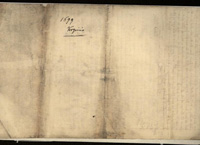MS 43.04: Francis Nicholson Papers
Proposition for Supplying the Countrey of Virginia, with a Sufficient number of
much better Clergymen, than have usually come into it, and for the right Settling—
and good Government of them.
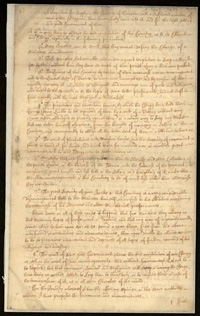
It is an easy thing to observe the bad constitution of this Country, as to its Church—
and Clergy, especially in the following particulars.
1°: Many Parishes are so small, that they cannot defray the Charge of a—
Ministers maintenance.
2°. Those parishes that are able, are under a great temptation to keep no Minister,
for by being without him they save so much of their parish Levy in their own pockets.
3°. The Livings in this Countrey by reason of their meanness are an encouragement
only to the Lowest Size of Divines, to adventure amongst us: and by reason of their—
equality are very ill calculated to distinguish and encourage men of parts and dilligence,
who ought to be spurred on by the hopes of some better preferments, and not left to—
fare equally with the most Negligent and blockish.
4°. The precarious and uncertain tenure, by which the Clergy here hold their—
Livings (being Liable to be deprived of them by a vote of a Vestrey without any—
crime either alleadged or proved against them) is a ready way to keep any Minister—
that can better himself elsewhere, from the thoughts of marrying or settling in the—
Countrey, and consequently to oblige all the better sort of them in a little time to leave us.
5°. The want of plantations and Mansion houses, and the Scarcity of convenient—
places to board at for Single, and much more for married men, is another great—
discouragement to good Clergymen to Settle among us.
6°. The abuses that are frequently put upon them by Sheriffs and other collectors of
the parish Levies, in the badness of the Tobacco and the lateness of the Payment,—
occasioning great trouble and loss both in the Selling and freighting of it, make thee—
Ministers encouragement in this Countrey to be of much less value than otherwise
they would be.
7°. The great Scarcity of good Books in this Countrey is a very considerable—
discouragement both to the Minister himself, and a Loss to his Auditors occasioning
the meanness of his Sermons and other Ministeriall performances.
From some or all of these causes it happens that few Ministers Stay among us—
that have any hopes of preferment in England, and that any man of ingenuity would
sooner chuse to live upon 40: or 50: pound a year there, free from the above-—
mentioned uncertainties and inconveniencies, than upon double the allowance here,
to be so precarious inconvenient and deprived of all hopes of further reward of his—
dilligence and industry.
8°. The want of some good Government shows the bad constitution of our Clergy
as well as the want of due encouragements. And without Government it is not to—
be Expected but that ignorance, Scandal and Negligence will creep in among the Clergy,
there being no method Setled to keep them to their duty, or to censure them in case of—
the transgression of it, as in all other Churches of the world.
For the Remedy whereof, I humbly offer my Opinion in the same method—
wherein I have proposed the Grievances and inconveniences.
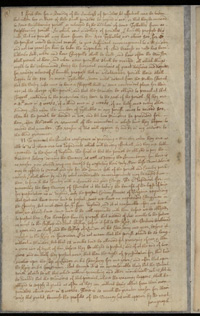
I First then for a Remedy of the Smalness of parishes, let effectuall care be taken—
that either two or three of those small parishes be joyned in one; or that they be annexed—
to Some Neighbouring parish, or enlarged by the addition of some Tythables from a—
Neighbouring parish. In which new modelling of parishes, I humbly propose this—
rule, that no parish may have fewer than 400 Tythables, nor above 800, for so—
the parishes would be great enough, to give Sufficient encouragement to a Minister,
and not too great for him to take the inspection of. And because no rule has been—
hitherto Sett, when and how Chappells shall be built, and how often the Minister
shall preach at them, and when new parishes shall be erected; all which things—
ought to be determined, being the frequent occasions of great divisions and disputes:
for remedy whereof I humbly propose that in whatsoever parish there shall—
happen to be 100 or more Tythables, Seven miles distant from the Mother Church,
that the Vestry take care to have a Chappel built in some convenient place for their
use, at the charge of the parish; and that the Minister be obliged to preach at that
Chappell, according to the proportion they bear to the rest of the parish. If they are
a 4.th once in 4 weeks, if a third once in 3 weeks, if an half, once every other—
Sunday. And when the number of Tythables in any parish comes to exceed 800,—
then let the parish be divided in two, and let two Ministers be provided for—
them, after the Death or removal of the incumbent in whose time they began to
exceed that number. The reason for this will appear by and by in my answer to the—
third grievance.
II To prevent the Parishes negligence in providing a Minister when they are—
able to do it, there are two Expedients which will be very effectuall, and they are both
agreeable to the Law of England. The first is that the parish be obliged to pay the—
Ministers Salary during the Vacancy, as well as during the Incumbency: for there is
no reason men should reap any benefit by neglecting their duty. Now those Vacant Salaries
may be applied to several good uses for the Service both of the parish and Country, parti
cularly I shall show by and by what considerable encouragements may be raised from—
them, to furnish this Country with a Learned and good Clergy. The 2d. Expedient for—
preventing the long Vacancy of Churches is the taking the benefit of the lapse of time
for presentation as in England, only the present Circumstances of Virginia requiring
that patrons have more time to present, since we have no unprovided Clergymen in
the Country, but must send for ym. from England, and it is reasonable after we have
them, we should have some time to be well acquainted with them, before we be obliged
to present them; I do therefore humbly propose that instead of Six months to the patron
as much to the Bishop and Arch-Bishop, before it fall to the King, the Vestries be allowed
2 year and an half, and the Bishop of London or his Comisary one year, before it
devolve to the King or Governour. I do not mean that the Parish should be so long—
without a Minister, but that 18 months time be allowed for procuring of one, & then
a years time of tryall of him, before they be obliged to present; and if at the end of two—
years and an half they present none, that then the right of presentation for that time
devolve upon the Bp of London or his Comissary, for one year; and after that upon
the King or his Governour. But because it is an unreasonable thing that the Vacant
parish should be all that while without preaching and other ministeriall duties, let it
be Enacted that the Ministers of that precinct, where the vacancy happens, shall be
obliged to supply it gratis as often as they can, without being absent from their own
parishes above once in 8 weeks. There is so much the greater reason for their
doing this gratis, because the profitts of the Vacancy (as will appear by the next
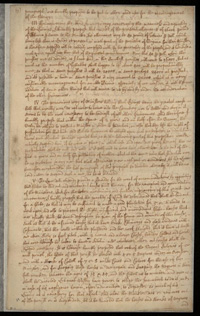 paragraph) are humbly proposed to be put to other good uses for the encouragement—
paragraph) are humbly proposed to be put to other good uses for the encouragement—
of the Clergy.
III For answering the third, Inconveniency concerning the meanness and equality—
of the Livings, I humbly propose that instead of the present allowance of 16000 pound—
of Tobacco P Annum to the Minister, his allowance may be 40 pound of Tobacco P poll, which—
being less than is Levied at present in most part of the parishes of Virginia for their Minister,
is therefore supposed will be readily complyed with by the generality of the people, and is likewise a
much more equall tax than that of the present maintenance. Now this 40 P poll, when the—
parishes are so divided, as I have said, in the Smallest parishes will come to 16000, but as—
much as the number of Tythables shall happen to be above 400, will be proportionably—
more, so that in some parishes it will be 20000, in some perhaps 24000 at present,—
and it's possible in time in some parishes it may amount to 32000 which is a very—
considerable encouragement for an able Divine: especially if we consider it with the—
addition of some other things that will occur to us by and by under the consideration—
of the other Grievances.
IV The precarious way of Ministers holding their Livings being the greatest cause—
both that worthy men do not care to come into the Countrey, nor to Settle and stay in it,—
seems to be the most necessary to be redrest of all other Grievances. And therefore I
humbly propose that within the Space of 2 years and an half after the Vacancy, the—
Vestry be obliged to present a Minister in order to Induction, or else that they lose the right of
presentation for that time: And that the Governour be obliged upon such presentation to induct him:
Except such objection be made against him, as by the following part of this proposition would—
actually suspend him, if he were in place; in which case and upon due proof thereof the—
presentation shall be null and void in it self and no more time allowed then to the end of the—
first 2 years and an half for presenting of another. But at the same time that Induction may—
be no protection to any man that shall afterwards grow negligent or scandalous, let the Law—
hereafter mentioned in the last paragraph of this proposall be Enacted whereby it will be no—
hard matter to suspend such a one, thô he is inducted.
V The Law doth already provide a Remedy for the want of accomodations, by appointing
that Glebes be laid out and convenient houses built thereon, for the reception and accomodation
of the Ministers. But for the better ascertaining and further improving of this great—
conveniency, I humbly propose that the quantity of Land be determined that shall be laid out
for a Glebe, so that it may be sufficient to make a good plantation for 5. or 6. hands to—
work upon, and also to prevent the Slight, insufficient, and incomodious Glebe-houses that
are usually built, let some description be given of the form and manner of the house,—
such as that it be a framed house, that it have brick Chimneys and glass windows with—
Casements, that the walls within be plaistered and the roof shingled, that it have at least
one clear Story 10 foot pitch, with 2 rooms and alarge Closet, besides Cellars and Garrets;
that care likewise be taken to have a kitchin and whatever other outhouses shall be—
judged necessary. It is likewise humbly proposed that out of the Vacant Salaries of—
each parish, the Glebe of that parish be stocked with 4 or 5 Negroes under an Overseer,
and with a Stock of Cattell of 7 or 8 milk Cows and Calves for the use of the—
Minister, and for keeping these houses in due repair and keeping the Negroes in their
full number between the ages of 15 & 45, and the Cattell as to number and age as—
shall be directed, Let each Vestry have power to oblige the Incumbent to do it, and,—
in case of his negligence herein, after admonition, to Sequester so much of his—
Living as is necessary for that effect. And when the Minister dies or removes out
of the parish or is suspended, let it be Enacted that the houses and Stocks of Negroes
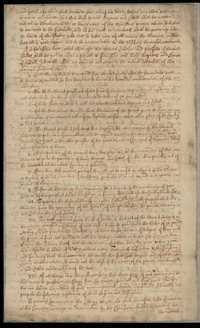 and Cattell aforesaid be made good out of his Estate, before any other debts or—
and Cattell aforesaid be made good out of his Estate, before any other debts or—
Legacies whatsoever, and that those parish Negroes and Cattell shall be never—
Subject to Attachments &c. as being none of the Ministers proper estate but shall
be annexed to the freehold, and at his death or removall shall be given up into—
the hands of the Vestry, who are to take care of all during the Vacancy, and to—
keep all in good repair, and to be accountable to the Visitors hereafter mentioned.
If it be asked here, what other use the Vacant Salaries and profitts of Vacant
Glebes shall be put to, after a parish is furnished with those negroes and Stocks
of Cattell, I humbly offer my opinion concerning the entire disposall of the—
vacant Salaries thus.
- 1.Let the Vacancy begin to be computed from the next quarter after the Incumbents death,—
Suspension or removall, so farr being due to him or his Execrs, in consideration of his—
incumbency. - 2.Then let the Vacant parish out of the fund of Vacancies be provided with a Library of—
well chosen books, for the use of the Minister to the value of 50. pound Sterl: - 3.Let the Glebe be Stocked with the abovementioned Negroes and Cattell.
- 4.Let the New intrant Minister have the Sume of 30 pound given to him in—
consideration of his removall either from England, or from some other place of the Country
to that parish. - 5.The Vacant parish it self being thus Supplyed, let what remains of the Vacant—
Salaries be put into a Comon Stock, and be applied towards the same uses (viz.t) books,
Negroes and Cattell in the other parishes of the precinct, where (for want of Vacancies) they
are unprovided of them. - 6.All the parishes of the precinct being thus provided, let the remainder of the—
Vacancies go to the providing of books, Negroes, and Cattell, for the other parishes out of
the precinct, till the whole Country is provided. - 7.If any thing still remains, perhaps it might not be unfitt to allow it to the Widow—
or Orphans of the last incumbent, if he left any, provided it do not exceed one years—
income of the Living. - 8.If after all there is any thing remaining, let it be given to the maintaining of poor—
Scholars of that parish at School and College, or for any other good use the Country thinks fitt. - VI.To prevent the abuses of Sheriffs and other Collectors. I humbly propose that the—
Minister have the nomination of the Collectr. of the parish Levy, the parish allowing—
that Collector the usuall Salary. - VII.The best expedient I can think of for books, is, that out of the Vacant Salaries in
the manner abovesaid a Library of well chosen books be provided to the value of 50 pounds
Sterling, And to prevent the imbezelling of those books, let one Catalogue of them with
the prices at first cost be lodged with the Vestry, an other with the Comisary, and a—
third in the Library it self with the Minister. Let them be called over every year—
and inspected by order of Vestry, and at every Trienniall Visitation by the Comissary;
and for every book that is wanting, let double the first Cost be paid out of the Ministers
Living or other Estate: It would not be amiss if the name of the parish were Stamped
in gold Letters on the outside of the book. - VIII.Of all things it is the most necessary that some form of good government be
laid downe to preserve the Clergy from Ignorance, Scandall, and Negligence. And for—
this and beside the method of good encouragement already mentioned, I humbly
propose the following expedients of Strict Censure and Disipline.
To prevent Ignorance in the Clergy let all who shall hereafter take Licences
in this Countrey undergo an Examination by the Comissary assisted by some of the—
learnedest
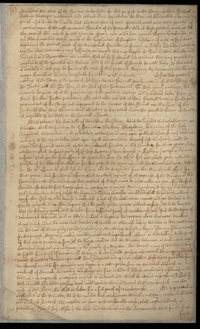 Learnedest Ministers of the Countrey, to be chosen for that purpose, by the Clergy at their Generall—
Learnedest Ministers of the Countrey, to be chosen for that purpose, by the Clergy at their Generall—
meetings hereafter mentioned, and without their approbation let them not be admitted into any—
parish. Let it also be Enacted that the Ministers of each precinct meet once every quarter of
a year at some of the most convenient Churches of the precinct: And at these quarterly meetings let—
them exercise their talents by Sett discourses by every man in his turn against Popery, Quakerism, or
any other prevailing heresy, as also in the Explication of Scripture, resolving of cases of Conscience,
explaining the severall parts of the Ministeriall function, conferring, consulting and taking measures
together about removeing any difficulty or danger that may happen to them in their Ministry and
Exhorting and admonishing one another, that so by fraternall admonitions they may prevent the
complaints of the parishes and Vestries. And if the parish Libraries be well chosen, so that what
is wanting in one may be found in the rest of that precinct, they may by borrowing and lending
among themselves be very compleatly furnished on all Subjects.
Besides these quarterly—
meetings of the Clergy of the precinct, let there be one Generall yearly meeting of all the Clergy of
the Country with the Comissary at the Seat of the Government. To these yearly meetings, let—
accounts be given of all the proceedings at the quarterly meetings and directions taken from—
thence for their further proceeding. And what rules are Sett at their Generall meeting for the good—
government of the Clergy not repugnant to the Canons of the Chursh nor the Laws of the—
Country let them be in the mean time obligatory to themselves under the penalties therein contained,
till repeated by his Maty or the Generall Assembly.
And to prevent the Scandalls of bad life in the Clergy, let it be Enacted that whatsoever—
Minister shall be found guilty of Fornication, Adultery, Blasphemy, ridiculing of the holy—
Scriptures, or maintaining by preaching, writing, or in any open publick discourse any doctrine
contrary to the 39 Articles, shall upon tryall and conviction thereof lose his Living, and be—
Suspended from all exercise of the Ministeriall function of this Countrey for three years. And
whosoever shall be found guilty of Cursing Swearing drunkenness or Fighting (except in his own
defence) shall for the first offence be suspended from his Office for one whole year, and the—
profitts of his Benefice shall go for that year to the same use with the Vacant Salaries: And—
for the 2d. offence he shall lose his Living and be suspended from the Ministeriall Office for—
three years: And for the 3d. offence shall be utterly deprived of all exercise of the Ministry in this—
Country for ever. Provided always that complaint of all these crimes be made within one year after the fact.
Provided also that the first transgression in venting an erronious Opinion contrary to the 39 Articles upon
publick retracting thereof before the Judges and Visitors hereafter mentioned shall be pardoned, without—
any further Censure. And because drunkenness is one of the most comon crimes, and yet the hardest to be—
proved, whereby it too often happens that the guilty person escapes without censure, let it be Enacted—
that the following proof shall be taken for a sufficient proof of drunkenness (vizt.) first let the signes of
drunkenness be proved, such as Sitting an hour or longer in the company where they were drinking—
strong drink, and in the meantime drinking of healths or otherwise taking his cups as they came round
like the rest of the company; Striking, challenging, threatening to fight, or laying aside any of his garments,
for that purpose, Staggering, reeling, vomiting, incoherent impertinent, obscene or rude talking, let the proof
of these signes proceed so farr, till the Judges conclude that the Ministers behavior at such a time was—
Scandalous undecent and unbecoming the gravity of a Minister. But because many of those Signes may—
be fallible for a proof of drunkenness let two or three credible persons who were in the company (and not
drunke themselves) declare upon oath their judgment and opinion whether these Signes proceeded from
drunkenness or not [For vomiting may happen to a Sober person, from an accidentall Sickness or—
weakness of Stomack, and reeling and Staggering from a Sudden disease occasioning a giddiness in the
head, and an eagerness in arguing may rise to indecent and almost to abusive expressions] But if
these credible and sober persons upon oath declare their judgment that drunkenness was the—
cause of these Signes, this shall be taken for a full proof of drunkenness.
And to prevent—
negligence in the Minister, let it be enacted that whatsoever Minister not being necessarily hindred
with Sickness, lameness, bad weather or some such reasonable cause, shall neglect his duty in—
preaching, Catechising, Visiting the Sick and administering the Sacraments shall for the first
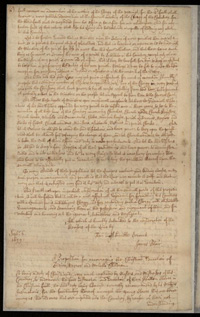 fault receive an admonition at the meeting of the Clergy of the precinct, for the 2d. fault shall
fault receive an admonition at the meeting of the Clergy of the precinct, for the 2d. fault shall
receive a more publick admonition at the Generall meeting of the Clergy of the Countrey, for
the third fault shall be suspended from his Office & benefice for one whole year. And for any—
further fault of that nature shall lose his Living and be declared incapable of holding any other—
in this Country.
Let it be further Enacted that no Minister enjoy the Salary of more parishes than one at a—
time, so to prevent the great abuse of pluralities; and that no bargains or agreements be made with
the Minister of the parish for less or more than this Law doth allow, and that there be no such
thing of Curacies or Serving the cure of a parish by Substitute in this Countrey, except only where
the Minister of any parish is grown old or infirm, that it may be lawfull for him to keep an assistant
to help him in performing the duties of his own parish. perhaps it may be the fitt to make the like
exception for necessary absence in England or elsewhere with the consent of the Vestry.
And to the end this good Law may not prove the ineffectuall for want of execution, I humbly
propose that a Standing number of Visitors be appointed, (vizt.) two of the Clergy in every precinct,
who with the Comissary shall have power to try all causes resulting from this law; but to prevent
all partiality either to the Ministers or the people, let an Appeal be from them to the Generall Court,
And besides those tryalls of Ministers upon occassionall complaints let there be Trienniall Visita-
tions of the said Visitors appointed for every parish to be visited once in three years, to see the—
execution of all these laws of this Countrey concerning Churches, Church yards, Church Registers,
Church books, Utensills and Ornaments, Glebes, Mansion houses, parish Libraries, Negroes and
Stocks of Cattell, Churchwardens, Ministers, assistants, Vestries, and parish Clerks.
And
let all Vestries be obliged to attend the said Visitations, and have power to levy upon the parish
what shall be allowed for defraying the charge of them, and let Churchwardens be obliged—
to take the Oath of their Office and duty to make presentments. And let the said Visitors
be obliged to keep a fair Register of all their proceedings and have power to administer
Oaths and to cite witnesses and to do every thing else that is necessary for causing the—
said laws to be effectually put in Execution, by executing the penalties thereof upon the
severall delinquents.
To every Article of these propositions let the Lawyers contrive good binding clauses, and
such proper encouragements and penalties that the Law may execute it self, and that—
every one that is entrusted may find it his duty and interest to put it in Execution.
And I doubt not upon impartiall consideration of all the severall parts of this proposi-
tion, it will be found that it will be most effectuall Expedient for furnishing this Countrey
with a Learned pious and diligent Clergy, and for rewarding such a Clergy with all Suitable
Encouragements, and Securing them in the possession and enjoyment of them, and for
detecting and throwing out the ignorant, Scandalous and Negligent.
All which is humbly Submitted to the consideration of the
Revisors of the Laws by
Their most humble Servant
James Blair.
Septr. 6.
1699
A Proposition for encouraging the Christian Education of—
Indian, Negroe and Mulatto Children.
It being a duty of Christianity, very much neglected by Masters and Mistresses of this—
Countrey, to endeavour the good instruction and Education of their Heathen Slaves in
the Christian faith, the said duty being likewise earnestly recommended by his Matyes
Instructions, for the facilitating thereof amongst the young Slaves that are borne
among us (the old ones that are imported into the Countrey, by reason of their not—
understanding
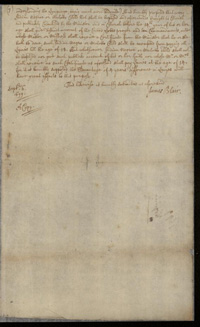 understanding the Language, being much more indocile) It is humbly proposed that every—
understanding the Language, being much more indocile) It is humbly proposed that every—
Indian Negroe or Mulatto Child that shall be baptised and afterwards brought to Church—
and publickly Catechised by the Minister and in Church before the 14th. year of his or her
age shall give distinct account of the Creed, Lords prayer and ten Commandments, and
whose Master or Mistress shall receive a Certificate from the Minister that he or she
hath so done, such Indian Negro or Mulatto Child shall be exempted from paying all—
Levies till the age of 18. But whatsoever Indian Negroe or Mulatto child shall not
be baptised nor give such publick account of his or her faith, nor whose Mr. or Mrs.—
shall receive no such Certificate as aforesaid shall pay Levies at the age of 14.
for it is humbly supposed the Advantage of 4 years difference in Levyes will—
have great effects to this purpose.
This likewise is humbly Submitted as aforesaid
James Blair.
Septr. 6.
1699.
A Copy.
